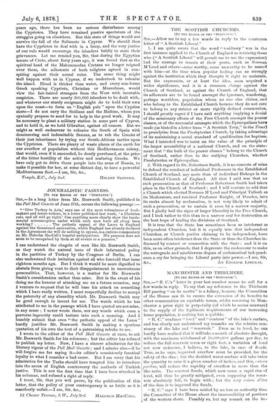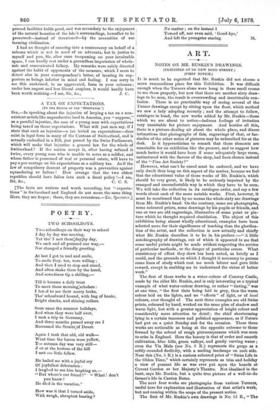MANCHESTER AND THIRLMERE.
[TO THE EDITOR Or THE " SPICOTATOR.1 SIR,—" R. C.'s" letter in your last number seems to call for a few words in reply. To say that my reference to the Thirlmere Bill passing "on its merits" is a fallacy, because the Committee of the House saw fit to ensure the extension of its benefits to other communities on equitable terms, whilst reserving to Man- chester a prior right in perpetuity (of which he seems unaware) to the supply of the legitimate requirements of our increasing home population, is nothing but a quibble.
"R. C." confuses "level" and "contour" of the lake's surface, and has clearly not understood my remarks on the relative con- stancy of the lake and "reservoir." Even as to level, be can hardly have realised that it will take a month of absolute drought, with the maximum withdrawal of 50,000,000 gallons per day, to reduce the full reservoir seven or eight feet, a variation of level not now unknown, I believe, to the lake, in case of floods. True, as he says, improved overflow must be provided, for the safety of the dam ; but the doubled water-surface will take twice the quantity to raise it a given number of inches, and this, cmtcris paribus, will reduce the rapidity of overflow in more than the like ratio. The severest floods, which now cause a rapid rise of level, will thus be greatly mitigated, even supposing the reser- voir absolutely full, to begin with ; but the very raison d'are of the dam is to impound the floods.
"R. C." says I have been misled by no less an authority than the Committee of the House about the inaccessibility of portions of the western shore. Possibly so, but my remark on the im- proved facilities holds good, and was secondary to the enjoyment of the natural beauties of the lake's surroundings, hereafter to be preserved—instead of threatened—by the necessities of our teeming civilisation.
I had no thought of entering into a controversy on behalf of a I scheme which is not in need of an advocate, but in justice to I myself and you, Sir, after once trespassing on your invaluable space, I can hardly rest under a groundless imputation of whole- sale and concentrated fallacy. My remarks were solely directed against the habit of opponents of the measure, which I seem to detect also in your correspondent's letter, of treating its sup- porters as beings inferior in mind and feeling. I was sorry to see this enshrined, in an aggravated, form in your columns ; under less august and less liberal auspices, it would hardly have
been worth noticing.—I am, Sir, &c., J. C.



































 Previous page
Previous page